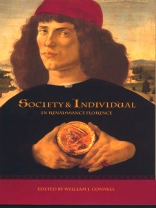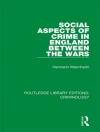Renaissance Florence has often been described as the birthplace of modern individualism, as reflected in the individual genius of its great artists, scholars, and statesmen. The historical research of recent decades has instead shown that Florentines during the Renaissance remained enmeshed in relationships of family, neighborhood, guild, patronage, and religion that, from a twenty-first-century perspective, greatly limited the scope of individual thought and action. The sixteen essays in this volume expand the groundbreaking work of Gene Brucker, the historian in recent decades who has been most responsible for the discovery and exploration of these pre-modern qualities of the Florentine Renaissance.
Exploring new approaches to the social world of Florentines during this fascinating era, the essays are arranged in three groups. The first deals with the exceptionally resilient and homogenous Florentine merchant elite, the true protagonist of much of Florentine history. The second considers Florentine religion and Florence’s turbulent relations with the Church. The last group of essays looks at criminals, expatriates, and other outsiders to Florentine society.
Jadual kandungan
Acknowledgments
Abbreviations
Introduction
William J. Connell
1. ‘Be Rather Loved Than Feared’
Class Relations in Quattrocento Florence
F.W. Kent
2. Giannozzo and His Elders
Alberti’s Critique of Renaissance Patriarchy
John M. Najemy
3. Li Emergenti Bisogni Matrimoniali in Renaissance Florence
Julius Kirshner
4. Michele del Giogante’s House of Memory
Dale Kent
5. Inheritance and Identity in Early Renaissance Florence
The Estate of Paliano di Falco
Thomas Kuehn
6. Perceived Insults and Their Consequences
Acciaiuoli, Neroni, and Medici Relationships in the 1460s
Margery A. Ganz
7. The War of the Eight Saints in Florentine Memory and Oblivion
David S. Peterson
8. Naming a Nun
Spiritual Exemplars and Corporate Identity in Florentine Convents, 1450–1530
Sharon T. Strocchia
9. The Prophet as Physician of Souls
Savonarola’s Manual for Confessors
Donald Weinstein
10. Raging against Priests in Italian Renaissance Verse
Lauro Martines
11. Liturgy for Nonliturgists
A Glimpse at San Lorenzo
William M. Bowsky
12. The Florentine Criminal Underworld
The Underside of the Renaissance
John K. Brackett
13. Lay Male Identity in the Institutions of a Tuscan Provincial Town
James R. Banker
14. Insiders and Outsiders
The Changing Boundaries of Exile
Alison Brown
15. The Identity of the Expatriate
Florentines in Venice in the Late Fourteenth and Early Fifteenth Centuries
Paula Clarke
16. Clement VII and the Crisis of the Sack of Rome
Paul Flemer
Contributors
Index
Mengenai Pengarang
William J. Connell holds the Joseph M. and Geraldine C. La Motta Chair in Italian Studies at Seton Hall University and is a member of the Institute for Advanced Study, Princeton. He is coeditor of Florentine Tuscany: Structures and Practices of Power (2000), author of La città dei crucci: fazioni e clientele in uno stato repubblicano del ‘400 (2000), and coeditor of Renaissance Essays (1993).












